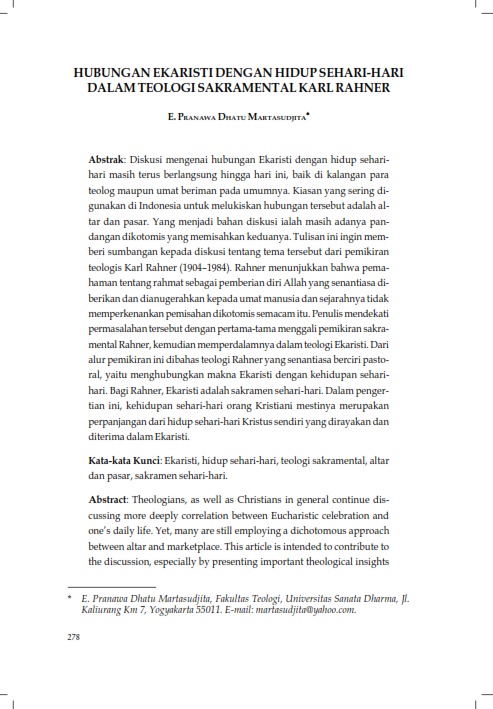Hubungan Ekaristi Dengan Hidup Sehari-Hari Dalam Teologi Sakramental Karl Rahner
Abstract
Abstrak: Diskusi mengenai hubungan Ekaristi dengan hidup sehari- hari masih terus berlangsung hingga hari ini, baik di kalangan para teolog maupun umat beriman pada umumnya. Kiasan yang sering di gunakan di Indonesia untuk melukiskan hubungan tersebut adalah al tar dan pasar. Yang menjadi bahan diskusi ialah masih adanya pan- dangan dikotomis yang memisahkan keduanya. Tulisan ini ingin mem- beri sumbangan kepada diskusi tentang tema tersebut dari pemikiran teologis Karl Rahner (1904–1984). Rahner menunjukkan bahwa pemahaman tentang rahmat sebagai pemberian diri Allah yang senantiasa di- berikan dan dianugerahkan kepada umat manusia dan sejarahnya tidak memperkenankan pemisahan dikotomis semacam itu. Penulis mendekati permasalahan tersebut dengan pertama-tama menggali pemikiran sakramental Rahner, kemudian memperdalamnya dalam teologi Ekaristi. Dari alur pemikiran ini dibahas teologi Rahner yang senantiasa berciri pastoral, yaitu menghubungkan makna Ekaristi dengan kehidupan sehari- hari. Bagi Rahner, Ekaristi adalah sakramen sehari-hari. Dalam pengertian ini, kehidupan sehari-hari orang Kristiani mestinya merupakan perpanjangan dari hidup sehari-hari Kristus sendiri yang dirayakan dan diterima dalam Ekaristi.
Kata-kata Kunci: Ekaristi, hidup sehari-hari, teologi sakramental, altar dan pasar, sakramen sehari-hari.
Abstract: Theologians, as well as Christians in general continue dis- cussing more deeply correlation between Eucharistic celebration and one’s daily life. Yet, many are still employing a dichotomous approach between altar and marketplace. This article is intended to contribute to the discussion, especially by presenting important theological insights of Karl Rahner (1904-1984) who would not allow such a dichotomy. Rahner presents a creative theology of grace primarily as God’s Self-gift, continuously offered to every single human being throughout our his- tory. We will begin with the presentation of Rahner’s sacramental theology, followed by the theology of the Eucharist. Rahner’s theological thought, it is argued, remains pastoral in character, that relates meaning of the Eucharist to day-to-day Christian living and practices. For Rahner, the Eucharist is a sacrament of the everyday. In this sense, the Christian’s daily life should be the extension of the daily life of Christ celebrated and received in the Eucharist.
Keywords: Eucharist,dailylife,sacramentaltheology,altarandmarketplace, sacrament of the everyday.

DISKURSUS applies the Creative Commons license (CC BY). We allow readers to read, download, copy, distribute, print, search, or link to the full texts of its articles and allow readers to use them for any other lawful purpose. Full information about CC BY can be found here: https://creativecommons.org/licenses/by/4.0/












